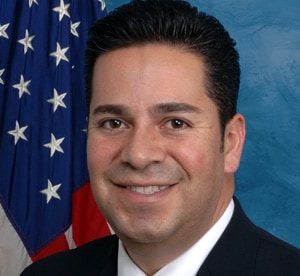
U.S. Rep. Ben Ray Luján
When I meet with constituents at town halls, during open office hours or just in restaurants or grocery stores, one of the most common questions I hear is: Why did the banks get bailed out while I’m still struggling?
And that’s an important question, and a concern that I share. When I entered Congress, I voted against the bank bailout because it didn’t do enough to help the people I visit with across New Mexico, there wasn’t enough transparency or oversight, and it didn’t do enough to address the challenges facing Main Street.
Since then, one of my primary focuses has been to reform Wall Street and to prevent future bailouts of big banks courtesy of the American people. For too long, New Mexicans have been harmed by the irresponsible actions of Wall Street. Under the Bush Administration, this lack of accountability led to a bailout of Wall Street and a near collapse of our financial system.

Over the past year, we’ve taken some steps to rein in banks and stand up for the people of New Mexico. In December, I was proud to join my colleagues in the House of Representatives to pass the Wall Street Reform and Consumer Protection Act. It made progress to hold Wall Street accountable, end taxpayer funded bailouts, and protect consumers from the gambles of big banks.
Preventing ‘too big to fail’ banks
And now the Senate is debating its version of Wall Street reform. It’s a debate that I’m following closely because we can’t get our economy back on track without fixing the financial system and making sure the savings of our families are safe from the excessive risks blindly taken on by big banks.
Unfortunately, Senate Republicans spent days refusing to even allow for consideration of Wall Street reform, using talking points ripped right out of a political consultant’s playbook and claiming reform will cause more bailouts. The fact of the matter is that this legislation will end the very bailouts that these same Republicans gave for big banks. Reform legislation will allow bad banks to fail, and it will reduce the fallout for the American people.
Under this legislation, when a bank fails, it will be broken down and sold off – and the costs to pay for this operation will come from the banks themselves, not American taxpayers.
In the House legislation, I was able to include an amendment that helped prevent “too big to fail” banks from coming into existence. Under current law, a bank cannot merge with another bank if the combined deposits equal or exceed 10 percent of all U.S. deposits. However, there is currently a loophole that allows a bank to buy a nonbank entity, such as a thrift, and exceed 10 percent of all deposits. For example, Bank of America was able to purchase Countrywide Mortgage.
Simply put, my amendment would close this loophole. It would prevent banks from merging with thrifts if the combined deposits equal or exceed 10 percent of all U.S. deposits. This ensures that no bank can grow beyond 10 percent of all U.S. deposits through a merger. My amendment would help prevent the creation of “too big to fail” entities that could threaten the stability of the financial system.
Furthermore, the House version of the legislation would make Wall Street banks repay the bailout money they got from taxpayers. It’s outrageous that they are giving themselves millions in bonuses while the people who bailed them out are still struggling.
Now is the time
I’m going to fight to make sure this language is in the final legislation, but most importantly I’m going to keep fighting for Wall Street reform that ends predatory lending practices, prevents costly taxpayer bailouts, creates tough new rules on the riskiest financial practices, and improves oversight and enforcement.
This legislation helps achieve these goals. Putting people ahead of big banks should not be partisan, and I’m encouraged that Republicans have finally decided to allow debate. Now it’s time for them to help finally enact tough new rules to protect our savings and investments instead of trying their hardest to block reform and maintain the status quo.
Nationally, we’re seeing jobs created for the first time in three years, but we have much more to do – and we can’t get our economy back on track without fixing the problems that got us here and finally holding Wall Street accountable when it takes risks that jeopardize the entire economy.
Luján, a Democrat, is the U.S. representative for the 3rd Congressional District in Northern New Mexico.
